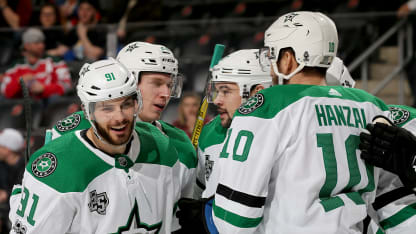Martin Hanzal's son, who will turn 6 in January, has just started to play hockey. Not just learning to skate or learning to put on the gear, but playing on a real team.
On Sunday mornings, Hanzal heads to a suburban Dallas rink to watch the action unfold and, occasionally, his son will ask him for some pointers about what to do in certain situations.
Hanzal's face lights up at the discussion.
After frustrating, injury-plagued first half, Hanzal presses forward
One of the Stars' prized summer acquisitions, the veteran center looks healthy and ready for a breakthrough

Whether you're an NHL player like Hanzal or not, those moments of shared interest with a child are golden. Okay, maybe they're a little more golden when you're an NHL player who has played 651 NHL regular-season games.
All of this is new for the father of two, including his son's requests that hockey games be put on the TV at home, and requests for updates on the outcome of games and who the Stars play next.
Still, Hanzal's son and daughter, almost 3 years old, are still oblivious to the moments when Hanzal is at home when he shouldn't be. For instance, when the Stars are on the road and he's been unable to play, or when he can't join in regular games and practices.
In some ways, that burden is born alone -- as it is for all professional athletes whose bodies prevent them from doing their job.
This season, it is a burden Hanzal has felt more keenly than he'd like.
"You know, I think it's more the mental part," he said. "When you are hurt, you don't practice with the guys; you don't skate with them; you don't pretty much see them. And when it happens a couple of times, it's hard coming back, because I'm always working hard just to get healthy. Then I came back (for a) few games and I got hurt again.
"So, the mental part is probably worse than the physical."
This past year has been full of not just a little upheaval for the big center from Pisek, which is located in the South Bohemian region of the Czech Republic.
After spending his entire NHL career in Arizona -- the team that drafted him 17th overall in 2005 -- last year at the trade deadline, the 30-year-old was dealt to the Minnesota Wild.
A pending unrestricted free agent, Hanzal knew this was likely to happen. Still, it was nonetheless disruptive as all trades are. His family went home to the Czech Republic and then joined him later in Minnesota where the Wild were dispatched in the first round by St. Louis.
"I think it was harder for me than for the kids," Hanzal said. "They are still young. So ... they didn't really care. They didn't go to school, so they were pretty much playing around for two months. They had a good time.
"I'm sure for younger players, it's probably different if they don't have a family. But for us, it was a lot of moving -- a lot of traveling for me to figure out. Trying to figure out day care, or something for the kids. ... It was a lot of work. But that's part of the business, right?"
Of course.
And while Hanzal has nothing but good things to say about his time in Minnesota, he was looking forward to finding a new hockey home with some stability for he and his family. He found it in Dallas.
"That's actually what I wanted this summer," he said. "I wanted 2-3 years signed somewhere so I have the security for my family. I can put my kids through school. Now we are all settled in Dallas. We love it in Dallas; it's awesome place. Great fans. Great hockey team. Great organization. So we are really pleased to be there."
And maybe that's been what has made this season especially trying for one of the game's premier two-way centers. Excited to be part of a team that had repatriated Stanley Cup-winning head coach Ken Hitchcock, acquired and signed Ben Bishop in goal, acquired Marc Methot on the blue line and signed free-agent winger Alexander Radulov, Hanzal didn't get to training camp before he suffered an ankle injury working out with his new teammates in early September.
It has been a mighty struggle since to find that all-important rhythm.
After missing time during training camp, Hanzal played in the Stars' first 11 games and then missed three.
He returned for six games and then missed two more.
He played two and then missed seven more with a hamstring injury.
Jason Spezza has had to lean into a faceoff circle often enough against Hanzal since he joined the Stars before the 2014-15 season to understand how important the signing was for Dallas.

© Getty Images
"Marty's one of the top shutdown centermen in the game, I think," Spezza said. "He's hard on draws, he's always above you, he's got some offense to his game. He does a lot of things that don't show up on the stat line at the end of the game.
"He's a big cog of our team. Because he does a lot of little things in a lot of key areas and he can play at the end of games, he can play to start penalty kills, he can win draws on the left side. It's all stuff that gives you the puck more and gives you possession as a team. Definitely, we miss him when he's out."
Spezza, who has battled back and other injuries over the course of his long career, understands well the challenge for a big man coming back after multiple injuries, and how that challenge isn't just in the physical realm.
"I went through something similar last year and kind of had two nagging injuries back-to-back, and I played three games in between them and you start doubting yourself, what's going on or why you keep tweaking things," Spezza explained. "And then, I went the rest of the year without having anything. It sometimes just goes in waves and it can get frustrating as a player, because you want to be in the lineup.
"Doesn't matter who you are. You feel hopeless when you're out of the lineup, especially when the team starts losing games and you feel the pressure to come back and play quicker."
When Hanzal first came to North America, he had already been drafted by the Coyotes. He played one year under Brent Sutter with the Red Deer Rebels of the Western Hockey League. He didn't know the language, but he knew the game -- and Sutter made sure he got Hanzal's best.
"Completely cold," Hanzal said of his first experiences in North America. "I didn't speak any English. I didn't know anybody. No Czechs on the team. I very much had to learn English. That was the hardest thing."
But once the language started to come, the rest was natural.
"I wasn't scared at all," Hanzal said. "It was just because I know how to play hockey, so it was just pretty much the language that was the hardest part for me. It was actually a really good year for me. I had a really good year."
"I think (Sutter) helped me a lot. He was really hard on me, but that's what I needed, sometimes, when I was younger. We had a great time and I was playing well, so I kind of enjoyed it. That was a lot of fun for me."
When Hanzal arrived in Arizona as a rookie at the start of the 2007 season, Keith Ballard was already prepping for his third season as an NHLer. He remains impressed that Hanzal stepped right into the heart of the fierce center battles within the Pacific Division, regularly going head-to-head with some of the biggest and toughest in the business like Ryan Getzlaf, Joe Thornton and Anze Kopitar.
"Joe Thornton and him used to battle nonstop, and Joe's a mean player. He is," Ballard said recently. "It was amazing to see how well (Hanzal) would do at both ends of the rink."
After Ballard left Arizona, he found himself on the other side of the Hanzal skill set.
"He's just so hard to handle down low," Ballard said. "He's just so big and strong. The way he plays, it just seems like a perfect match for Hitch."
As a player that also endured frustrating injuries near the end of his career, Ballard feels for what Hanzal has -- and is -- going through.
"I feel bad for Marty, because I know what that's like," said Ballard, who works with the Minnesota Wild, spearheading their successful grassroots hockey program. "Your body doesn't feel good. And he's in a new environment, too. Mentally, it's taxing. All the little things that factor into it."
Hanzal has been back in the lineup now for four games.
He's been as advertised -- maybe more. He scored his first power-play goal of the season against New Jersey (and his first non-empty-net goal) and then added an assist against Philadelphia. He's killed penalties and, generally, done all of the things that Hitchcock has been expecting him to do.
Hitchcock is a realist, though. It's not about the mental toughness, it's just the reality that it's hard to play like Hanzal plays and get over the kinds of various, nagging injuries he's faced down through the first half of the season.
"I just think once you're injured, it's hard to get back healthy," Hitchcock said. "That's why we waited so long before we brought him back. I think you just got to fight and give whatever you've got to give us. Whatever he's giving us right now is plenty. It's very effective. He's a very effective player. He plays a lot of high-pressure situations and he helps us."
Not to put too fine a point on it, but when Hanzal is who he can be, he helps in so many areas of the game that it's almost difficult to quantify his value. He kills penalties and takes key draws, which takes the pressure off guys like Tyler Seguin and Jamie Benn, who have been asked to help fill that part of the void created by Hanzal's off-and-on-again season.
Hanzal also provides a significant net-front presence on a power-play unit that is just now emerging from some second-quarter doldrums.
Throw in his 5-on-5 play and, well, more than a few fingers are crossed that he can continue along this path.
"I'm trying to not think about it, but there is some extra stuff I have to do before the game and after the game, just to stay on top of it and make sure it doesn't happen again, right?" Hanzal said. "If it happens, it happens. It is what it is. Just you have to put so much extra work in it and make sure you're on top of it and make sure you don't get hurt again.
"It's really tough on me right now. I have to just keep working hard and make sure I'm doing everything I can to stay healthy, because when I'm healthy, I can play. But if you're only 80 percent, ask any hockey player if he can play at 80 percent in this league. It's really tough."
This story was not subject to approval of the National Hockey League or Dallas Stars Hockey Club. You can follow Scott on Twitter at @OvertimeScottB, and listen to his Burnside Chats podcast here.


















